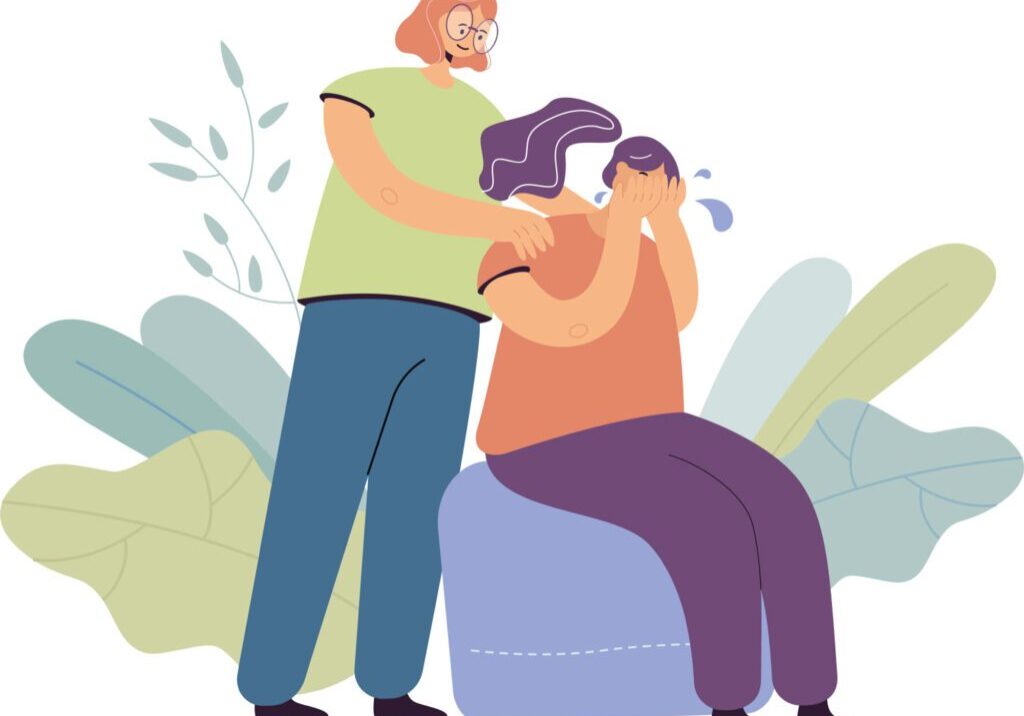You may have heard of the Sandwich Generation, but you may be wondering what it is and if you are a part of it. Simply put, those in the Sandwich Generation are “sandwiched” in between raising children and caring for their parents. The “bread” of that sandwich is the people you’re now responsible for, whether that is directly (hands-on caretaking) or indirectly (acting as a medical proxy, arranging care, coordinating appointments, etc. for an aging adult). If this sounds like you, you are not alone. Nearly 18 million Americans are caring for aging and increasingly dependent parents.
Transitioning into a different relationship with someone who you did or still do look to as your support can be a painful process. We may see these people as shelters and even part of the village that helps raise our children. Or there can be a strained relationship from childhood, which might stoke resentment. But in any case, the reality of that relation-shift can feel overwhelming.
As someone who’s handled the care of a parent for many years, I understand the struggles of working with and around changes in physical and cognitive ability. This journey has been a complicated one, but I have learned (and am still learning) much in terms of how to navigate these waters. I find it helps to break things down into manageable parts.

Having the hard conversation
It’s difficult enough understanding things need to change, but convincing someone else is even harder. It can wound a person’s pride to tell them you don’t think they can do it all on their own anymore. Sometimes, these talks are met with hostility, rigidity or deep embarrassment. It helps to imagine being in that position yourself and coming up with a script or a bullet list of things that would make this news easier for you to take. If you proceed with tenderness and preparation, it can make the process easier on both parties.
If you have a strained relationship with your parent(s), it might help to consult a third party, whether that’s a sibling, a spouse, a therapist or a social worker who can help you practice and act as an intermediary in those conversations.
Avoid caretaker burnout
Being the “filling” of that sandwich can be tricky to manage. Even though caretaking can be very rewarding, once you add in the demands of parenthood, jobs and making ends meet, adding on care for your older relatives can take a toll. The Mayo Clinic provides a list of the signs of emotional exhaustion and burnout (which range from shifts in sleep, weight, mood and more), so you can keep an eye out for them.
It’s important to remember that self-care is not only good for your mental and physical well-being, but it improves the quality of care you can provide to others. No one wants to snap at their child or parent because all that stress needs an outlet. We want to be our best selves for them; a watered, regenerated and nurtured self, equipped with the patience to navigate life’s recurring challenges. “Make time for your own health care and mental health care appointments,” says Erin Stidham, Licensed Marriage and Family Therapist and Clinical Director of Creekside Counseling in Redding. “You have to maintain your own wellbeing in order to take care of everyone else. Caregivers frequently avoid or put off their own appointments. Don’t delay, just do it. Take care of yourself.”
Here are some tips to keep in mind:
- Stay hydrated. Take your reusable water bottle with you wherever you go. Drink BEFORE you feel thirsty.
- Pre-plan meals and healthy snacks and prepare large dishes ahead of time, divide them into portable containers and take them with you or heat them up for the family, so you are not cooking meals on those way too busy days or stuffing a candy bar down instead of a healthy snack.
- Plan to take breaks. Your local hospice chapter can provide respite care at low or no cost. Reach out to friends and family for support. Take your caree to an exercise class for seniors or a local senior center for a few hours. Then take a break! Don’t try to do everything alone, all the time!
What bases to cover when taking on the care of a relative
Whether you’re caring for a parent, another relative or someone in your chosen family, there are questions you’ll need to ask and concrete tasks you’ll need to take care of. Here is a suggested list.
- Talk with your parents about their wishes, including religious requests, medical preferences, health priorities and their Will or Trust.
- Establish medical proxy/power of attorney. Become acquainted with their doctors and get on the medical documentation, allowing you to make decisions on their behalf (especially if they cannot speak for themselves). Not having a health care proxy form in order can put you in a precarious position should your caree suddenly be unable to communicate. Further, if you have siblings or other people who may have differing opinions on care (even if they are well-meaning), it is good to establish one authority so nothing gets lost in the shuffle.
- Collect and organize documents and relevant information such as medical info (lab results, discharge summaries, insurance, durable power of attorney/health care proxy form, advance directives, list of medicines with prices and coverage, list of all numbers for their health care providers), birth certificate, marriage license, service records, divorce documentation and/or citizenship documentation (if applicable).
- Make a plan for their pet(s). It’s important to consider the impact those pets have on your caree’s mental health, your ability to take them on and what to do if you cannot.
- Make sure your senior dependent has a doctor who is inclusive. Perhaps your caree is plus sized or LGBTQIA+ and needs a doctor who will not dismiss or discriminate based on size, orientation or identity. If your caree is moving far to be with you, they will likely need to form new relationships with new doctors and a safe doctor can ease that transition.
- Try to establish a schedule. These changes can become overwhelming quickly and having a routine can ease the process.
- Assess communication and care needs, which may involve hearing devices, a service animal or medical equipment. Knowing and planning for what is required will help avoid financial surprises.
The important thing to remember through this journey is that no matter how insurmountable it feels, you’re not alone. From specializing therapists, support groups and your local community to organizations, home care assistants and more, people are there to help you keep the shine on your loved one’s golden years. You’ve got this.
Taking on the care of another person comes with additional costs, including essential upkeep, meds and possibly even outside care. Fortunately, there are resources for relief.
- Passages in Chico. Provides support for caregivers, care management and caregiver services, Medicare counseling, ombudsman services and more. passagescenter.org.
- IRS offers a dependent tax credit for spouses and dependent parents. If you want to keep your parents in the home, you can file for a Medicaid Caregiver Child Exemption (medicaidplanningassistance.org/child-caregiver-exemption).
- HCBS Waivers and 1915(c) Waivers (Medicaid.gov) help cover home and personal services, including in-home caregiving.
- If your elder has served in the military, the Veterans Affairs Program of Comprehensive Assistance for Family Caregivers (PCAFC) at VA.gov offers training, education and mental health care, as well as a monthly stipend to assist with the care costs.
- California In-Home Supportive Services (IHSS) (cdss.ca.gov/in-home-supportive-servicesprogram) provides in-home assistance to elderly and disabled individuals who qualify.
- California Department of Aging (aging.ca.gov) provides lists of resources
- California Department of Social Services (cdss.ca.gov) provides information on support.
- Administration for Community Living (acl.gov) offers grants for those feeling the crunch of caretaking
- Alzheimer’s Association (alz.org/norcal) helps people navigate the challenges associated with Alzheimer’s and dementia.
- Network of Care for Aging (trilogyir.com) is a web portal for both seniors and their carers to get answers.
- California Health Advocates (ahealthadvocates.org/HICAP) a nonprofit which counsels about Medicare, offers webinars addressing many issues including appealing loss of health care coverage.
- Family Caregiver Alliance (caregiver.org) helps those needing and giving care and offers many resources in Chinese, Tagalog, Spanish and Vietnamese, as well as English.
If your senior dependent falls under the LGBTQIA+ umbrella, there are organizations ready to provide assistance.
- Sage is a technical assistance resource that offers guidance, assistance, social connection and more to your loved one. sageusa.org.
- National Center for Lesbian Rights (nclrights.org) and the Human Rights Campaign (hrc.org) can help you navigate combating health care discrimination.
Posted in: Family Life & Support
Comment Policy: All viewpoints are welcome, but comments should remain relevant. Personal attacks, profanity, and aggressive behavior are not allowed. No spam, advertising, or promoting of products/services. Please, only use your real name and limit the amount of links submitted in your comment.
You Might Also Like...

Breastfeeding: Challenges and Solutions
As an Integrative Airway and Feeding chiropractor, I love helping moms and babies with breastfeeding issues. My journey with these families often begins during the prenatal phase. Comfortable prenatal experiences […]

Preparing Your Child for a New Sibling
Preparing your child to welcome a new sibling is both exciting and challenging. While this can provide your older child with a lifelong friend and playmate, the soon-to-be big sibling […]

What is a Resource Parent? – How to Open Your Home and Heart to Children in Need
Here in the North State, approximately 1,350 children are not able to remain in their own homes. The Department of Social Services matches these children with a resource family where […]

Asking Children Open-ended Questions
Most parents have had the frustrating experience of asking their children questions and receiving one word answers: “What did you do at school today?” The answer: “Nothing.” We want to […]

How Doulas Can Help Moms and Families During and After Childbirth
According to the nonprofit doula organization, DONA International (DONA.org), “From the beginning of time, people have been cared for and nurtured during pregnancy, birth and postpartum. Family, friends and neighbors […]



